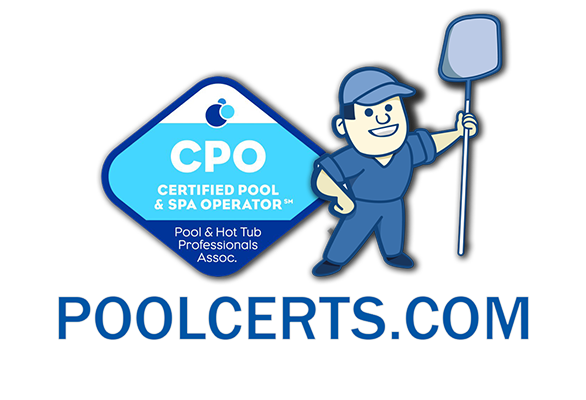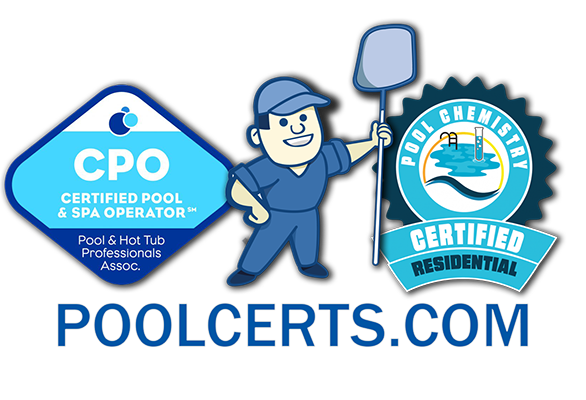In March of 2023, an outbreak of Pseudomonas aeruginosa caused ear pain, rash, or pain or swelling in the feet or hands of 23 people who swam in a hotel pool in Maine. It was believed that this outbreak was caused by poor maintenance and monitoring of chlorine levels. Incidents like this highlight the importance of a pool inspection.
Keeping pool safety standards at the frontline is critical for all aquatic facilities. But do you really need a certified pool operator (CPO) to help you do that?
Yes! Today, we’ll discuss the role of a CPO and how they can help ensure you pass your next inspection and keep your patrons safe.
The Role of a Certified Pool Operator (CPO)
A Certified Pool Operator (CPO) helps maintain safe and compliant swimming environments. CPO professionals are trained to complete the following tasks and more:
- Manage water chemistry
- Ensure proper equipment operation
- Oversee facility maintenance
Hiring a Certified Pool Operator brings expertise to your facility. With their knowledge, you can reduce liability risks and provide a better swimming experience for everyone involved.
In some states, like Florida, a CPO is required to oversee the facility’s management. Examples of facilities that need this include commercial pools and aquatic facilities.
Do You Need a Certified Pool Operator?
If you live in a state where a CPO is not required, do you really need to hire one? YES! Let’s touch on a few instances where you will want to employ a CPO for your facility.
If you own or manage a commercial pool, having a Certified Pool Operator on your team is essential. Their expertise can significantly reduce the risk of costly fines and operational hiccups.
Even residential properties can benefit from hiring a CPO for inspections or routine maintenance. Their keen eye can spot potential issues before they escalate into major problems.
In addition, some insurance policies may require certified oversight as part of their coverage conditions. Being compliant not only protects your investment but also enhances guest satisfaction by providing a safe swimming environment.
Areas Where a CPO Can Ensure Compliance
Several key areas require close attention in pool inspections. A Certified Pool Operator (CPO) has the expertise to navigate these specifics and ensure compliance with local regulations.
Let’s discuss the knowledge a CPO will be able to bring to your facility to help with inspections.
Managing PH Levels
Maintaining proper pH levels is crucial for pool safety and comfort. Ideally, pH should range between 7.2 and 7.8. If it’s too low, swimmers may experience skin irritation; chlorine becomes less effective if too high. Regular testing ensures a balanced swimming environment for all users.
Chlorine Levels
Chlorine is vital for pool sanitation, effectively killing harmful bacteria and pathogens. Other disinfectants, like bromine or saltwater systems, can also maintain water quality. Each option has its unique benefits and drawbacks, so understanding them helps ensure a safe swimming environment while passing inspections seamlessly.
Chemical Balance
Balancing chemicals is vital for pool safety and comfort. A CPO ensures that the right ratios of alkalinity, calcium hardness, and stabilizers are maintained. This protects swimmers and helps prevent corrosion or scaling in your equipment, extending its lifespan significantly.
Required Safety Gear
Safety at a pool is key. Examples of required safety gear include:
- Life rings
- Throw ropes
- First aid kits
Safety gear must be accessible and well-maintained. Having them on hand protects swimmers and demonstrates compliance during inspections, showcasing your commitment to safety standards.
Placement of Signage
Clear, visible signs alert guests to potential hazards and swimming rules. They should be strategically located at entrances, near diving boards, and in restrooms to ensure everyone stays informed and safe while enjoying the facility.
Maintaining Equipment
Regular maintenance of filtration and circulation systems includes checking pumps, filters, and skimmers for optimal performance. Addressing wear and tear promptly prevents bigger issues down the line. A well-maintained system ensures efficient water flow, providing a safe swimming environment during your pool inspection.
Deck and Pool Surface Upkeep
Maintaining the deck and pool surfaces is crucial for safety and aesthetics. Regular cleaning removes debris, while repairs prevent slips and falls. A Certified Pool Operator understands risk management and ensures appropriate maintenance practices are followed, keeping your facility in top shape and ready for inspections while enhancing the overall swimming experience.
Proper Cleaning Procedures
Regular cleaning is a big part of pool maintenance and includes:
- Skimming debris
- Vacuuming the bottom
- Scrubbing walls
Using the right tools ensures a safe swimming environment. Proper procedures prevent contamination and extend the life of your pool equipment, keeping everything running smoothly throughout the season.
A CPO will understand the factors that play into keeping your pool clean and compliant.
Documentation and Record Keeping
Accurate logs are crucial for maintaining compliance during a pool inspection. They provide a clear history of water quality, maintenance schedules, and safety checks.
A Certified Pool Operator maintains detailed logs. Pool documentation demonstrates diligence and helps identify trends that could prevent future issues, enhancing overall safety and efficiency. In addition, these records demonstrate compliance.
How a CPO Can Help During Your Pool Inspection
A CPO can facilitate communication between inspectors and facility staff, ensuring all necessary information is readily available.
In addition, during the inspection, a CPO can identify and address concerns immediately. Their expertise allows quick solutions, whether adjusting chemical levels or repairing safety equipment. It’s a proactive approach that satisfies inspectors and enhances overall pool safety and compliance throughout the season.
Make Sure Your CPO Stays Certified
Hiring a Certified Pool Operator can significantly improve your chances of passing your next pool inspection. Their expertise ensures compliance with regulations and enhances safety. Consider investing in CPO certification or services to maintain a pristine, regulation-ready pool environment throughout the year.
Does your facility employ a CPO? Keep in mind that their certification does expire! At Pool Certs, we provide the training and testing needed to become and stay a CPO.
Our Certified instructor, Chad Bland, will help you easily gain the knowledge you need so you can feel confident walking into your test. Are you ready to get started? Register for our online CPO certification program today.


